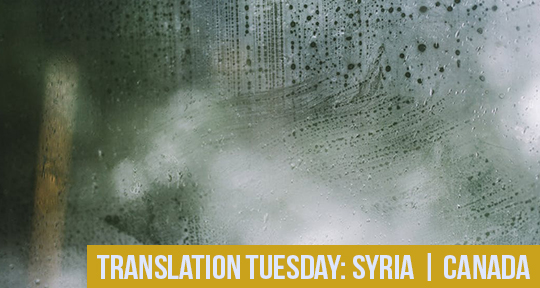Inheritors of Silence (ورثة الصمت) is about the mutually reinforcing relationship between private catastrophes and the collective trauma of political repression. Tragedy metastasizes across time and space—from one generation of women to the next, and from the family’s origins in Homs, Syria, to Nice, and then to Montreal, where the narrator, Sami, and his daughter, Jano, now live. In this excerpt from the opening chapter, Sami is groping through the first hours after his daughter’s attempted suicide. As a Syrian immigrant in Quebec, he is one kind of outsider, a foreigner (though, as Sami himself points out, his neighborhood is full of foreigners like him living lives that are symmetrical but rarely touching). Suddenly, Sami realizes that he is an outsider when it comes to his daughter’s life, too. After a lifetime of loss, he is desperate to find a way back in. Arabic has a great capacity for metaphor, especially metaphors of sentiment, and capturing the full metaphorical repertoire of this text in English while maintaining the fluidity of the prose is challenging. But this allusive vocabulary is a cornerstone of Sami’s narrative voice. He is a poet, and even his quotidian surroundings conjure a stream of images that allow him, and the reader, to wander out of exile—if only for a sentence or two.
—Chloe Bordewich
The morning came with dull normality. A bright light pierced the windowpane as huge plows rumbled past, emitting a ceaseless stream of high-pitched beeps. The day before, a storm had inundated Montreal with snow, stuffing the city’s streets. I woke now to concussive rumbling and tried to shake the previous night’s madness from my body. Exhausted from insomnia, I remembered that what had happened the day before was not a dream. Without so much as a suitcase or a word of farewell, my daughter had, of her own free will, tried to go to her death. My daughter, only in her twenties, had been infused with the poison of knowledge she couldn’t bear and decided not to go on.
I leaped from bed as if stung by the memory of a torture chamber full of scorpions and traitors. I had to face the morning and confront reality in all its baseness, the depravity of events wilder than a wedding of lunatics. Fearing the darkness of night, as well as the light of day, I put my head underwater and fumbled like a slumbering blind man until the world stopped breathing. A deadly silence descended, and I groped for noise. READ MORE…



